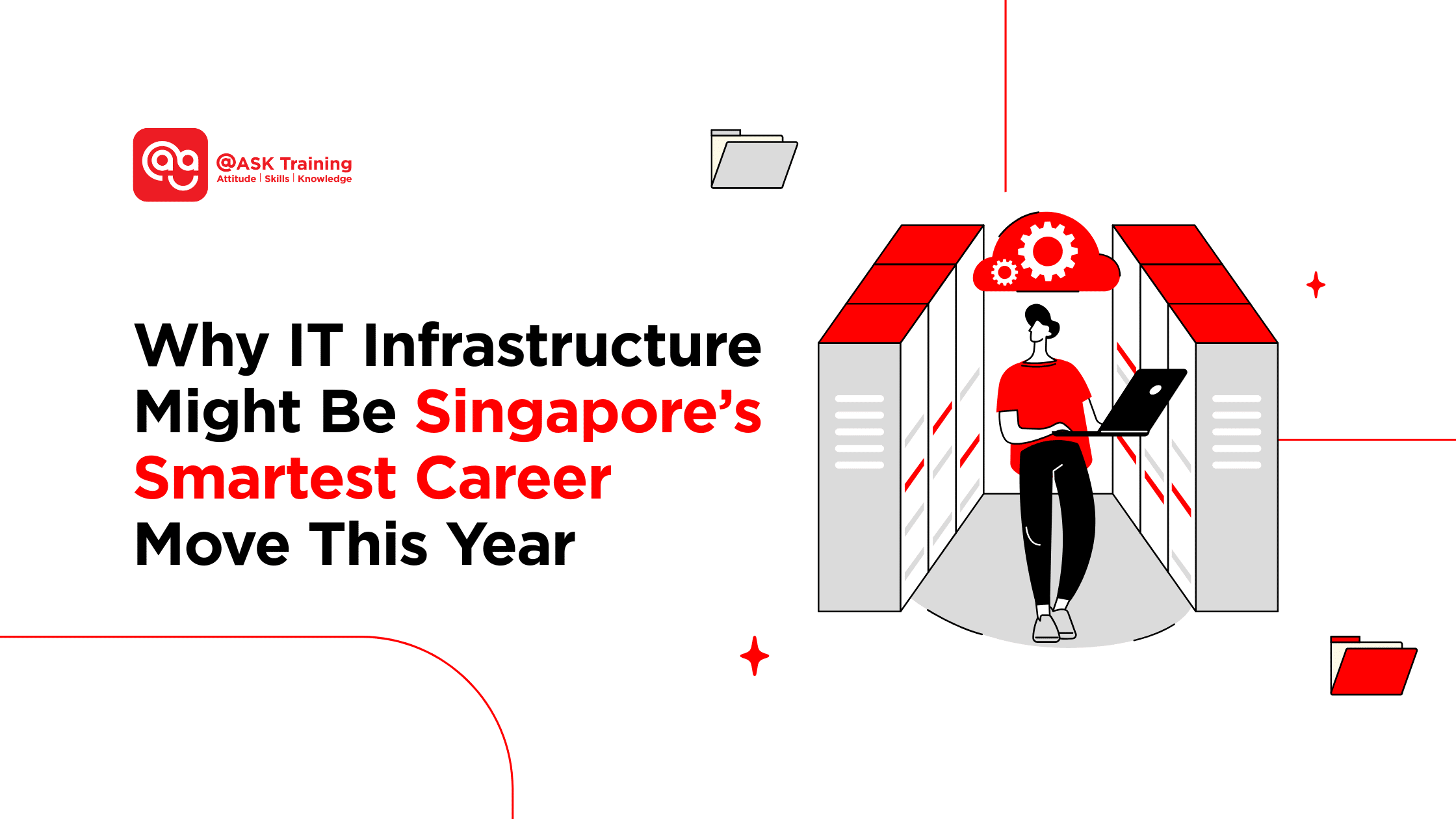
When you send an email, use a banking app, or even scroll through social media, you’re relying on IT infrastructure. It’s the foundation that keeps businesses and services running in our digital world.
In Singapore, where technology plays a central role in the economy, this field offers stable career opportunities with room for growth.
If you’re considering a career in IT infrastructure, whether you’re just starting out, switching careers, or looking to advance, this article will break down what you should know:
- What IT infrastructure involves: Servers, networks, cloud systems, and security
- Career pathways: From entry-level roles to specialised positions
- Salary benchmarks for 2025 based on current market trends
- Key skills that employers look for in Singapore’s tech sector
Let’s take a closer look.
The Foundation of an IT Career Path
IT infrastructure is the backbone of modern technology, consisting of three core components: servers (which store and process data), networks (connecting systems and users), and security (protecting data and operations).
Understanding these fundamentals is the first step toward building a career in this field. To get started, you’ll need foundational skills in:
- Operating System (OS) Administration (e.g., Windows, Linux)
- Networking Concepts (IP addressing, DNS, firewalls)
- Hardware Basics (troubleshooting servers and devices)
For those new to IT, entry-level certifications like CompTIA A+ (hardware/software fundamentals) and CompTIA Network+ (networking essentials) provide a structured way to validate these skills and stand out to employers.
With these basics in place, you’ll be ready to explore the next steps, whether that’s specialising further or advancing to mid-level roles.
Navigating Career Growth in IT Infrastructure
Once you’ve built a solid foundation, advancing your IT career path often involves specialising or moving into key leadership roles.
Key mid-level and senior-level certifications can help you progress, such as:
- Cisco CCNP (for networking professionals)
- AWS Solutions Architect (for cloud-focused roles)
Career progression in IT infrastructure typically follows three main pathways:
- Technical Specialisation: Deepening expertise in areas like cloud computing or cybersecurity.
- Management: Advancing to team lead or IT manager positions.
- Consulting: Providing expert guidance as an independent consultant or solutions architect.
In this rapidly evolving field, continuous learning is essential. Emerging technologies like AI-driven operations and edge computing are transforming IT infrastructure, making ongoing education and certification renewal crucial for long-term success.
As you consider these growth opportunities, it’s helpful to understand the specific roles and responsibilities available at each level.
Key Roles in IT Infrastructure
As Singapore accelerates its digital transformation, these four roles form the backbone of the IT infrastructure sector:
1. Network Administrator
The backbone of organisational connectivity, ensuring seamless communication across devices and locations.
Core Responsibilities:
- Install, configure, and maintain LAN/WAN networks, routers, switches, and firewalls
- Monitor network performance and troubleshoot outages or bottlenecks
- Implement security measures like VPNs and access controls
- Document network configurations and maintain inventory
Technical Skills Needed:
- Proficiency in TCP/IP, DNS, DHCP, and routing protocols
- Experience with Cisco IOS or Juniper Junos
- Knowledge of network monitoring tools (Wireshark, SolarWinds)
Career Trajectory:
- Entry-level: Network Support Technician → Network Administrator
- Mid-career: Network Engineer → Senior Network Architect
- Leadership: IT Infrastructure Manager or Network Operations Lead
Why It Matters:
As organisations expand digital operations, reliable networks become critical for everything from cloud connectivity to IoT deployments.
2. Systems Engineer
The architects of computing environments, building and maintaining the platforms that power business applications.
Core Responsibilities:
- Deploy and maintain server infrastructure (physical/virtual)
- Automate system deployments using tools like Ansible or Puppet
- Manage storage solutions (SAN/NAS) and backup systems
- Optimise system performance and capacity planning
Technical Skills Needed:
- Windows Server/Linux administration
- Virtualisation (VMware, Hyper-V)
- Scripting (PowerShell, Bash)
Career Trajectory:
Junior Systems Admin → Systems Engineer
Senior: DevOps Engineer or Site Reliability Engineer
Leadership: IT Director or Chief Technology Officer
Why It Matters:
Systems form the foundation for applications and services, making this role essential for business continuity and digital transformation.
3. Cloud Specialist
The bridge to digital transformation, migrating and optimising workloads in cloud environments.
Core Responsibilities:
- Design and deploy cloud solutions (AWS, Azure, GCP)
- Migrate on-premise systems to cloud environments
- Implement cost optimisation and resource management
- Configure identity/access management (IAM) and security controls
Technical Skills Needed:
- Cloud platform certifications (AWS Solutions Architect, Azure Administrator)
- Infrastructure-as-Code (Terraform, CloudFormation)
- Containerisation (Docker, Kubernetes)
Career Trajectory:
- Cloud Support Associate → Cloud Engineer
- Senior: Cloud Architect or Cloud Security Specialist
- Leadership: Cloud Practice Lead
Why It Matters:
With 94% of enterprises using cloud services, specialists who can navigate hybrid/multi-cloud environments are invaluable.
4. Cybersecurity Analyst
The digital guardians protecting systems against ever-evolving threats.
Core Responsibilities:
- Monitor SIEM tools for security incidents
- Conduct vulnerability scans and penetration tests
- Implement endpoint protection and email security
- Develop incident response plans
Technical Skills Needed:
- Security frameworks (NIST, ISO 27001)
- Tools like Metasploit, Nessus, Splunk
- Compliance knowledge (PDPA, GDPR, HIPAA)
Career Trajectory:
- SOC Analyst → Cybersecurity Engineer
- Senior: Security Architect or Red Team Lead
- Leadership: CISO or Security Consultant
Why It Matters:
The average organisation faces 1,636 cyber-attacks weekly, creating relentless demand for security professionals.
These roles demonstrate how IT infrastructure professionals directly contribute to Singapore’s tech-driven economy.
Next, let’s examine the current job market outlook and what you can expect in terms of compensation.
Singapore IT Infrastructure Job Outlook & 2025 Salary Benchmark
Singapore’s tech sector is poised for significant expansion, with government and industry reports projecting strong demand for tech talent.
The Infocomm Media Development Authority (IMDA) anticipates sustained growth in tech roles, with broader estimates suggesting over 1 million digitally skilled professionals may be needed by 2025 to support nationwide digital transformation.
This aligns with Singapore’s strategic initiatives like the Digital Connectivity Blueprint, which is driving 5.6% annual growth in technology spending through AI adoption and infrastructure development.
Salary Trends
The market shows nuanced compensation patterns reflecting sector-specific demands:
- Core infrastructure roles maintain stable growth at 3.3% year-on-year, underscoring their foundational importance.
- Cybersecurity salaries have adjusted by 4.6% due to increased talent supply, though demand remains robust.
- Cloud and hybrid infrastructure roles continue to command premium pay, mirroring their pivotal role in digital transformation.
(Source: Ranstad)
2025 Monthly Salary Benchmarks (SGD)
Singapore’s tech sector offers competitive compensation that varies by specialisation and experience level. Below are the projected monthly salary ranges for 2025:
| Role | Entry-Level (Monthly SGD) | Mid-Career (Monthly SGD) | Senior (Monthly SGD) |
| Network Administrator | 3,000 – 4,500* | 5,000 – 7,000* | 8,000 – 12,000* |
| Systems Engineer | 3,500 – 5,000* | 6,000 – 8,500* | 10,000 – 15,000* |
| Cloud Engineer/Specialist | 4,000 – 6,000* | 7,000 – 10,000* | 12,000 – 18,000* |
| Cybersecurity Analyst | 4,850 – 7,350 | 5,000 – 8,000 (approx.) | Up to 15,000+ |
(Source: Morgan McKinley, JobStreet Singapore, Indeed SG)
*Note: Salaries vary by company size, certifications, and specific responsibilities. Data reflects 2025 projections for Singapore’s tech market.
High-Demand Specialisations
Companies are actively recruiting for these critical infrastructure areas:
| Specialisation | Relation to IT Infrastructure |
| Cloud Computing | Core to modern IT infrastructure; managing cloud platforms (AWS, Azure, GCP). |
| Cyber-Defence Roles | Protect IT infrastructure and networks from cyber threats. |
| DevOps Engineering / Infrastructure-as-Code (IaC) | Automate infrastructure provisioning and management. |
(Source: SDFE 2025)
Why These Skills Matter:
- Cloud platforms dominate new infrastructure deployments
- Cyber-defence roles are expanding 40% faster than other IT jobs
- Infrastructure-as-Code (Terraform, Ansible) is now standard for enterprise deployments
While these salary benchmarks reveal where the opportunities lie, success in these high-demand roles requires specific technical and soft skills.
Let’s now break down exactly what competencies employers are looking for.
In-Demand Skills in Singapore’s Tech-Driven Market
To thrive in Singapore’s competitive IT infrastructure sector, professionals need a balanced mix of technical expertise and interpersonal abilities.
Here are the key skills needed to succeed in Singapore’s tech-driven economy:
Technical Competencies
Modern infrastructure roles require specialised technical knowledge across these core areas:
- Virtualisation: VMware and Hyper-V expertise remains crucial for managing modern hybrid infrastructure environments.
- Cloud Platform Proficiency: AWS and Azure certifications are in high demand as cloud solutions become the default for new deployments.
- Cybersecurity Fundamentals: With cyber threats growing, skills in threat detection and zero-trust architecture, validated by certifications like CompTIA Security+ are becoming mandatory.
- Infrastructure-as-Code (IaC): Terraform and Ansible skills are now standard requirements, especially with government initiatives promoting secure automation practices.
- Automation Scripting: Python and PowerShell knowledge significantly boost efficiency in infrastructure management and DevOps workflows.
- Data-Driven Operations: The ability to leverage monitoring tools and analytics to optimise performance and predict issues is increasingly valuable.
Critical Soft Skills
Technical skills get you in the door, but these interpersonal abilities often determine promotions to leadership roles.
- Quick Problem-Solving: The ability to rapidly diagnose and resolve system issues under pressure.
- Clear Communication: Translating technical details into business terms for stakeholders across departments.
- Cross-Functional Collaboration: Working in IT seamlessly with security, development, and business teams.
- Adaptability: Continuously evolving with new technologies and methodologies in this fast-changing field.
Singapore’s Upskilling Ecosystem
Take advantage of available resources such as government funding, corporate support and more:
- SkillsFuture Credits: Government subsidies for certifications in cloud, cybersecurity, and infrastructure management.
- Corporate Training Programmes: Many employers now fund certifications and courses to retain top tech talent.
- National Initiatives: Programmes like RIE 2025 and Smart Nation are accelerating digital skills development through public-private partnerships.
Equipped with these technical and soft skills, you’re now ready to explore actionable steps to launch or advance your IT infrastructure career in Singapore’s dynamic market.
Wrapping Up
The opportunities in Singapore’s IT infrastructure sector have never been greater, however, success belongs to those who take actions.
As we’ve explored:
- The field offers diverse roles from cloud engineering to cybersecurity, each with strong growth potential
- Salaries remain competitive, especially for certified professionals in high-demand specialities
- Success demands both technical skills and soft skills that enable you to adapt and collaborate
Your Action Plan
Here’s a simple roadmap on how to start a career in IT infrastructure:
- Identify Your Path: Choose a specialisation that aligns with your interests (networking, cloud, security, etc.)
- Build Foundational Skills: Start with certifications like CompTIA A+ or AWS Cloud Practitioner for core knowledge
- Leverage Local Resources: Use SkillsFuture credits for approved courses and certifications
- Gain Practical Experience: Seek internships, labs, or entry-level roles to apply your learning
- Join Tech Communities: Engage with groups like GovTech Community or AWS Cloud Club for networking
You’ve got the facts, now it’s time to put them to work!
Ready to Build Your Future in IT Infrastructure?
The difference between thinking about a tech career and actually building one comes down to action. @ASK Training offers a variety of IT courses that can help you kickstart your career in IT Infrastructure!
Here are a few related IT courses to help you get started:
- IT Infrastructure and Operations: Learn the essentials of IT infrastructure from functions, management, networking, and cloud computing.
- IT Infrastructure Planning and Optimisation: Equip yourself with the skills to plan, design, and optimise IT infrastructure.
- Cloud Computing: Explore the world of cloud computing from fundamental concepts, architectures, and key characteristics.
- Cybersecurity and Ethical Hacking: Gain advanced expertise in cybersecurity practices, ethical hacking techniques, incident response, forensic analysis, and more.
These courses are also part of our full IT qualification programmes, where you can benefit from the SkillsFuture Career Transition Programmes (SCTP) that are designed to assist learners like you in gaining job-ready IT Infrastructure skills and being placed in IT roles upon graduation.
Enrol now and get in touch with us! Your future in IT infrastructure starts with one decision: make it today!
Related Courses
- IT Infrastructure and Operations
- IT Infrastructure Planning and Optimisation
- Cloud Computing
- Cybersecurity and Ethical Hacking
◆◆◆




